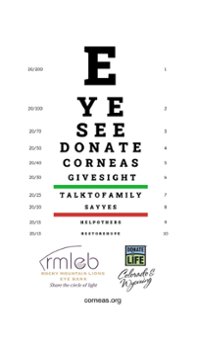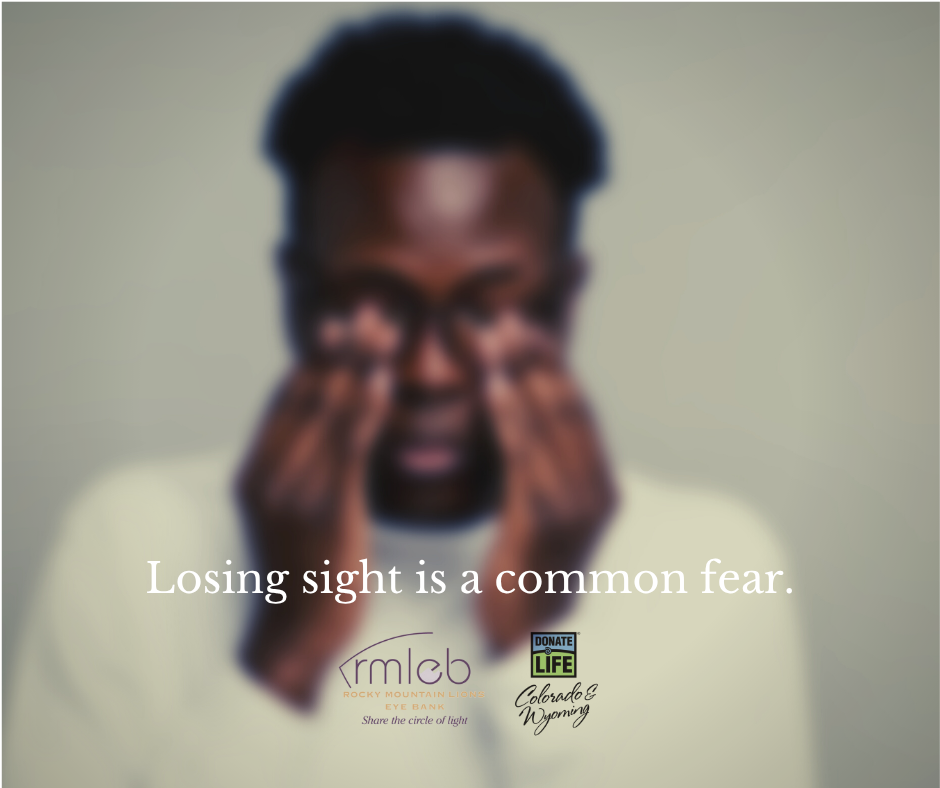One of Americans’ Biggest Fears is Losing Their Sight
Even though one of Americans’ greatest fears is losing their sight, there are ways to manage this fear by maintaining eye health and leaving a legacy of restored sight through eye donation.
By Ryeá O’Neill - August 4, 2025
The fear of losing eyesight is a prevalent concern among Americans, often ranking higher than the fear of losing other senses. They are more scared of going blind than getting cancer, a stroke, heart disease, or other serious health problems. This anxiety is understandable, as vision plays a crucial role in daily life, contributing to independence and quality of life. The prospect of losing sight can elicit fear of isolation, dependence, and an inability to engage in previously enjoyed activities.
There are ways to manage this fear. Learning about current blindness diseases, ways to maintain eye health, and how to leave a legacy of restored sight through eye tissue donation can help mitigate this fear and its effects.
Vision Loss is a Public Health Problem
There are over 3.4 million Americans aged 40 years and older who are blind or visually impaired. It is expected that this number will double by 2030. In addition, approximately 80 million Americans suffer from diseases that can cause blindness. More than 1.6 million Americans who are living with vision loss or blindness are younger than age 40. Vision loss affects all communities in a variety of ways, including increased healthcare costs and the need for support services, poor health, impact on quality of life, and mental health.
Contributing factors to the fear of losing sight include the increasing prevalence of age-related eye diseases like cataracts, glaucoma, and macular degeneration, which are common as the population ages. Additionally, the rise of digital screen use has heightened awareness of eye strain and potential long-term effects on vision.
Learning about blindness diseases, health-related diseases that can result in blindness, and age-related eye diseases can ease the fear of losing sight. Talk to your doctor and optometrist about your health conditions, family history, and any vision changes. Stay aware of local public health campaigns and advances in eye care, which aim to alleviate this fear.
Maintain Eye Health
By emphasizing awareness and prevention, individuals can be empowered with knowledge about maintaining eye health. Encouraging habits such as wearing sunglasses to protect against UV rays, taking regular breaks during screen time, and maintaining a diet rich in fruits and vegetables can all contribute to better eye health. Furthermore, innovations in medical treatments and technologies, such as laser surgeries and corneal transplants, offer hope and solutions for managing and even reversing some vision problems.

Remember to schedule and go to your annual eye exam! Many health conditions can be detected through an eye exam, contributing to the expression that the “eyes are the window to the soul.” Dr. Rebecca Taylor, MD, ophthalmologist, recently said, “The eyes can reflect illness that begins in another tissue far away from the eyes themselves." The American Academy of Ophthalmology recommends that all adults get an eye exam from an ophthalmologist by the age of 40, when early signs of age-related diseases and changes may begin to appear. Tell your eye doctor about any changes in your health or vision.
Leave a Legacy of Restored Sight
Some individuals have corneal blindness, and their only hope for restored vision is a corneal transplant. Conditions like Keratoconus, which affects 1 in every 2,000 Americans, and Fuchs’ Dystrophy can scar, distort, or cloud the cornea, preventing light from entering the eye. These problems can lead to poor vision and blindness.
Here at the Rocky Mountain Lions Eye Bank (RMLEB), we believe that as we learn more, we can do better. We continuously engage in research projects to enhance our technicians' skills and advance scientific knowledge and clinical practices, aiming to help others overcome blindness. We honor the donor and their family every step of the way, understanding their gift can restore sight for someone who is suffering.
If you feel strongly about giving the gift of restored sight through eye donation after your passing, we encourage you to take the critical step of registering your decision to be a donor. Share this heartfelt choice with your family, engaging them in a meaningful conversation about your wishes. Discuss your desire to donate, regardless of any health conditions or challenges you may face with your vision. It’s essential to communicate your wishes openly, ensuring your family understands your intentions well in advance of any tragic event. This conversation can be a powerful gift, fostering understanding and peace during difficult times. The notion of leaving a legacy of restored sight offers a comforting antidote to the anxiety of losing one's vision.
